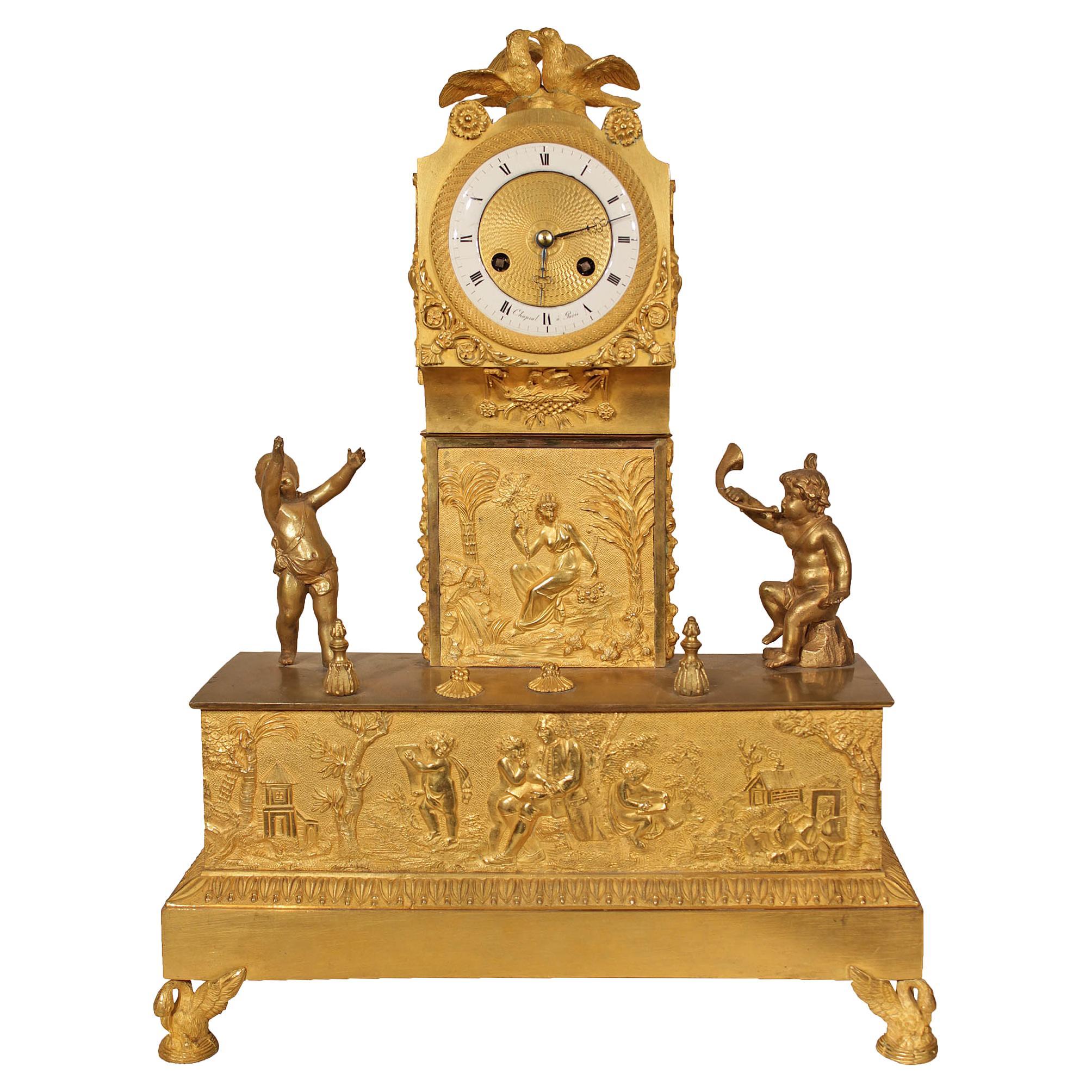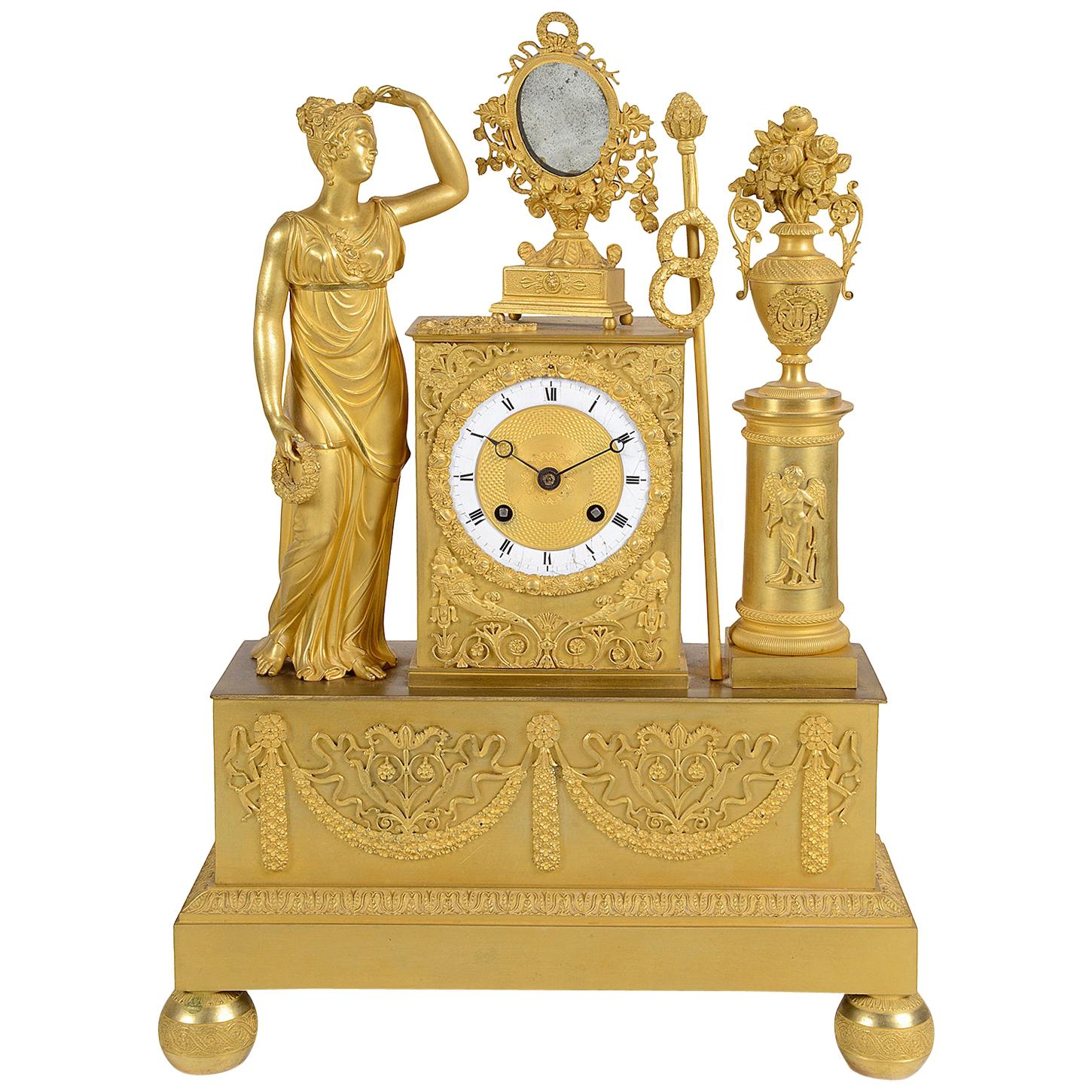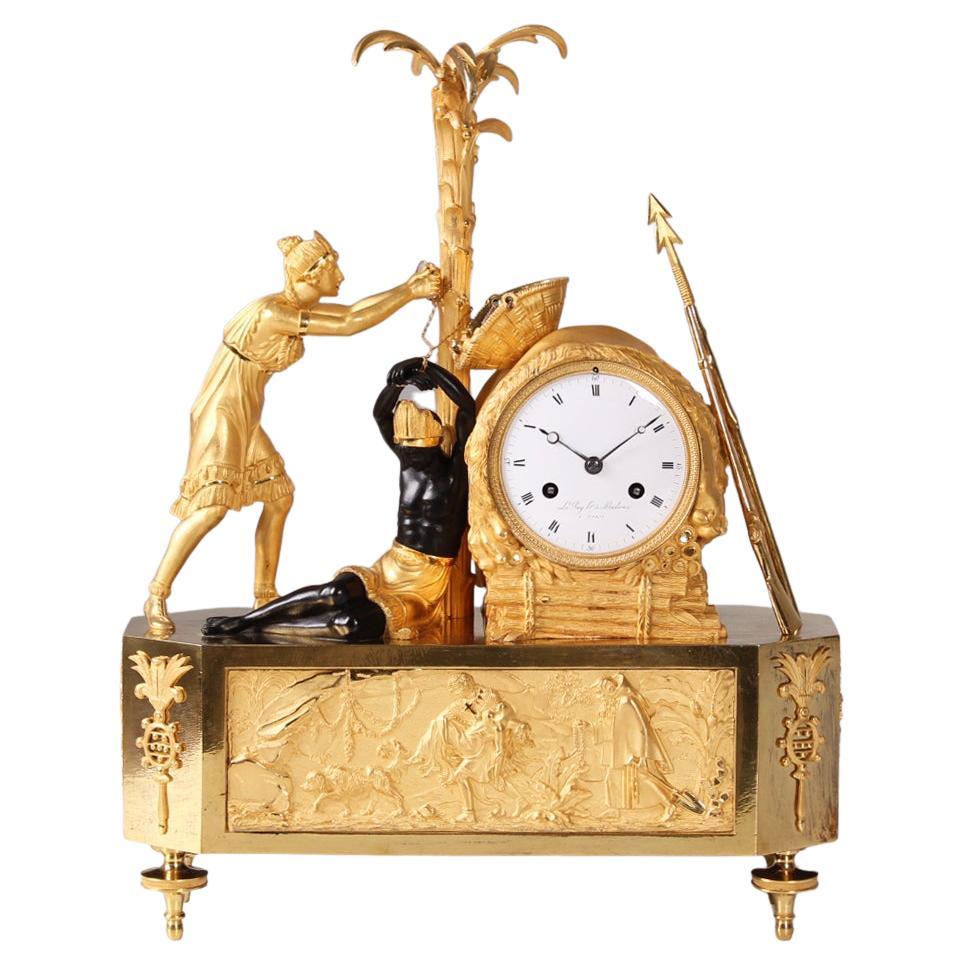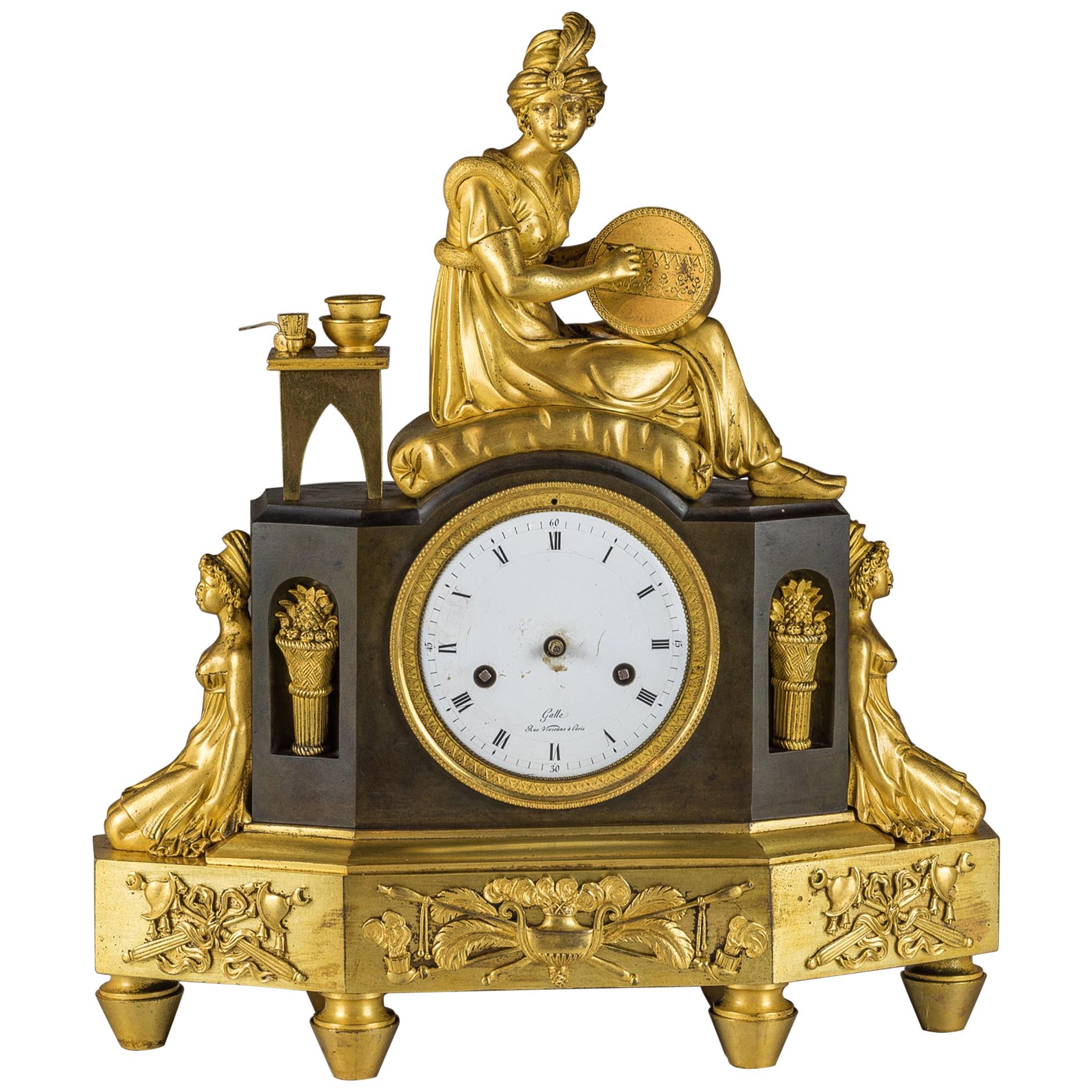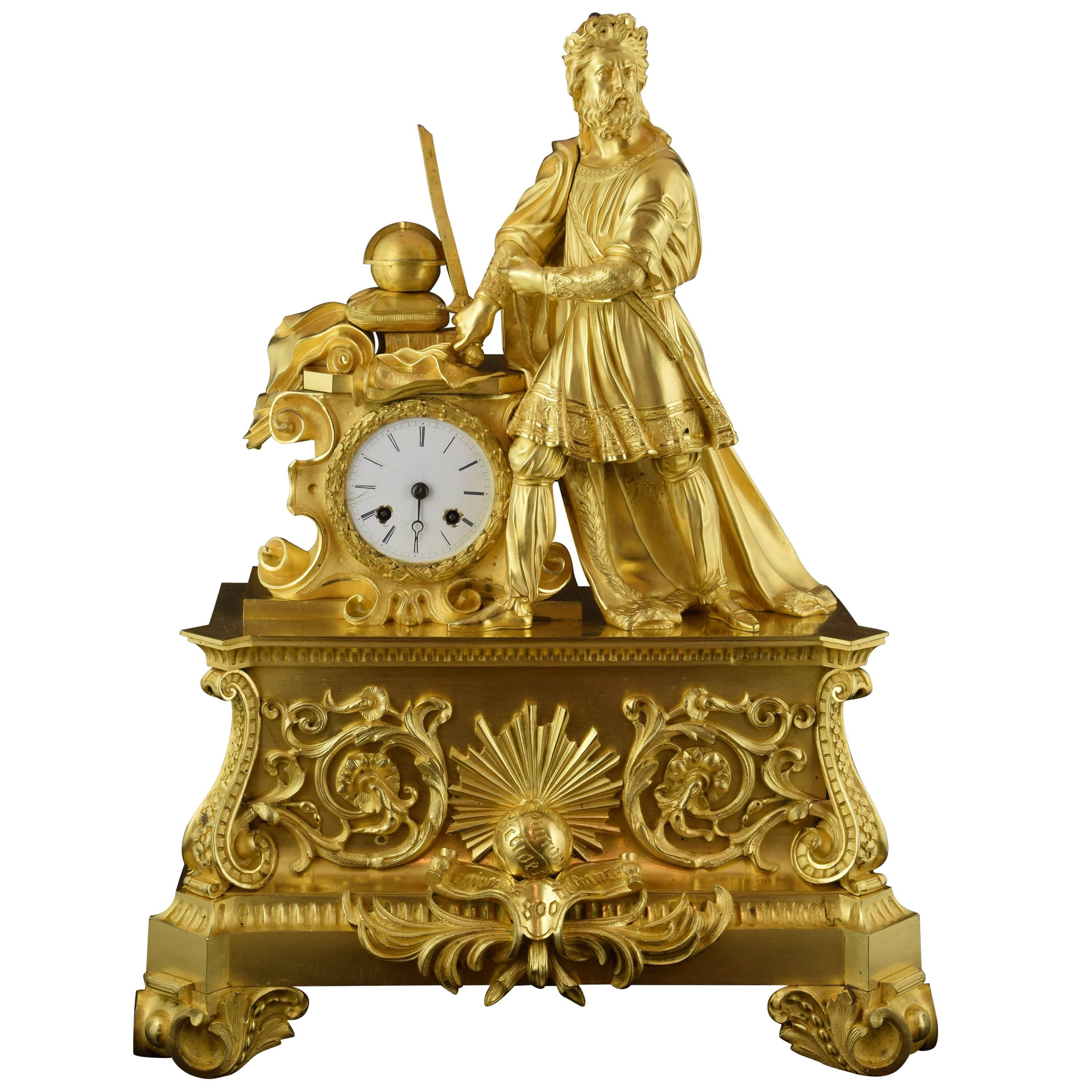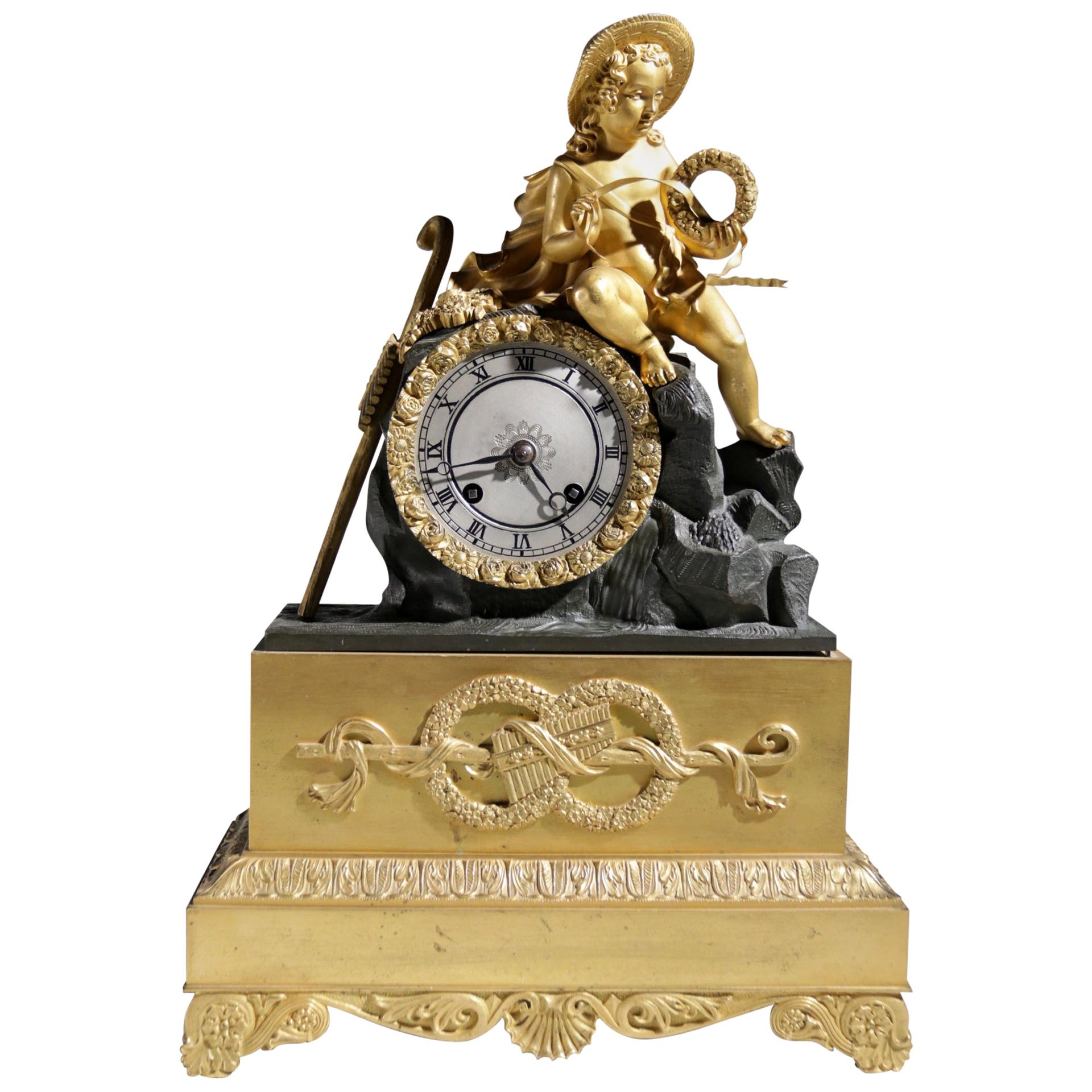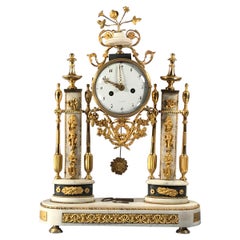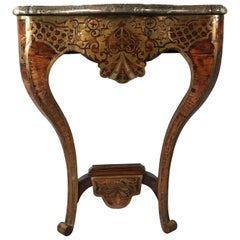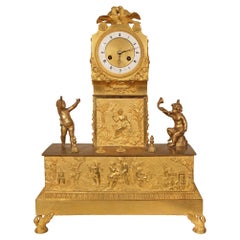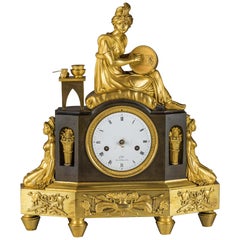Items Similar to Ormolu Mantel Clock, Belgium, circa 1810-1820
Want more images or videos?
Request additional images or videos from the seller
1 of 7
Ormolu Mantel Clock, Belgium, circa 1810-1820
$4,000
£3,093.84
€3,522.15
CA$5,743.35
A$6,274.79
CHF 3,288.64
MX$74,923.01
NOK 41,618.05
SEK 38,807.96
DKK 26,304.86
About the Item
Empire ormolu mantel clock, Belgium, circa 1810, Signed "J.B. Romaet a Gand". Decorated with a shepherd scene. Strikes the hour and half hour on a bell. With enamel clock face and silk suspension. In very good working condition.
- Dimensions:Height: 14.18 in (36 cm)Width: 10.63 in (27 cm)Depth: 3.55 in (9 cm)
- Style:Empire (Of the Period)
- Materials and Techniques:
- Place of Origin:
- Period:
- Date of Manufacture:1810
- Condition:Wear consistent with age and use.
- Seller Location:Belmont, MA
- Reference Number:1stDibs: LU1772218797382
About the Seller
5.0
Vetted Professional Seller
Every seller passes strict standards for authenticity and reliability
Established in 2013
1stDibs seller since 2015
245 sales on 1stDibs
Typical response time: <1 hour
- ShippingRetrieving quote...Shipping from: Belmont, MA
- Return Policy
More From This Seller
View All19th Century Louis XV Style Mantel Clock
Located in Belmont, MA
Unique French 19th century mantel clock.
This exquisite mantel clock has a Sevres porcelain dial plate and other Sevres porcelain decorations.
The movement with spring suspension. ...
Category
Antique 1890s French Louis XV Mantel Clocks
Materials
Ormolu
Louis XVI Ormolu Mounted Black and White Marble Mantel Clock, Paris, 1800
Located in Belmont, MA
Louis XVI ormolu-mounted black and white marble mantel clock, Paris, 1800.
The white enamel dial with black Arabic numerals is contained ...
Category
Antique 1790s French Louis XVI Mantel Clocks
Materials
Marble, Ormolu
$4,720 Sale Price
20% Off
Console Table, France circa 1760, Style of Andre Charles Boulle
By André-Charles Boulle
Located in Belmont, MA
Console Table, provincial France circa 1760, in the style of Andre Charles Boulle. Kingwood with brass inlays. This interesting console table is n...
Category
Antique 1760s French Louis XV Console Tables
Materials
Brass
Antique French Secretary Desk, France 1770-80
Located in Belmont, MA
Antique French Secretary Desk from the Late 18th Century
Explore this French 18th century secretary desk, crafted in France circa 1770-80...
Category
Antique 1770s French Louis XVI Secretaires
Materials
Kingwood, Satinwood
$11,200 Sale Price
20% Off
Louis XV-Style Cabinet with Secretary
Located in Belmont, MA
Introducing a truly exceptional cabinet with a hidden writing desk. This exquisite piece of furniture showcases a captivating combination of rosewo...
Category
Antique 19th Century French Louis XV Cabinets
Materials
Mahogany, Rosewood
18th Century Louis XV Secretary, France, 1770
Located in Belmont, MA
This exceptional French Louis XV secretary, crafted around 1770, is a stunning example of 18th-century craftsmanship. Featuring breathtaking ...
Category
Antique 1770s French Louis XV Secretaires
Materials
Kingwood, Satinwood
You May Also Like
French 19th Century Louis XVI St. Ormolu Mantel Clock
Located in West Palm Beach, FL
A spectacular and unique French early 19th century Louis XVI st. ormolu mantel clock, signed by Chapsal a Paris. The clock is raised on finely chased swan supports below a rectangula...
Category
Antique 19th Century French Louis XVI Mantel Clocks
Materials
Ormolu
19th Century French Classical Ormolu Mantel Clock
Located in Brighton, Sussex
A very pleasing early 19th century French gilded ormolu mantel clock, have a classical maiden standing in front of a mirror, with a pedestal supporting a vase of flowers. The white e...
Category
Antique 19th Century French Romantic Mantel Clocks
Materials
Ormolu
Early 19th Century Ormolu Mantel Clock, Atala freeing Chactas, Paris, circa 1810
Located in Greven, DE
Mantel Clock "Atala and Chactas"
Paris
Bronze (fire-gilt and patinated), enamel
Empire around 1810
Dimensions: H x W x D: 40 x 32 x 11 cm
Description:
Very rare and extremely high quality French mantel clock, so-called Pendule Au Bon Sauvage.
Depicted are scenes from the love story "Atala or the love of two savages in the desert" written by Francois René Vicomte de Chateaubriand in 1801. At the beginning of the 19th century, this was probably the most famous love story in Europe, but today it has been forgotten.
The story, set in present-day Louisiana (USA), is roughly rewritten about the forbidden love between Chactas, a young Indian, and Atala, the beautiful daughter of a Spaniard.
Chactas is captured in a battle between two Indian tribes, chained to a palm tree and is to be sacrificed. Atala wants to save his life and convert him to Christianity. She unties him from the palm tree at night and they flee together into the wilderness of North America. Their love for each other grows stronger and stronger and they have prospects for a future together.
The story takes a tragic turn when Atala, who must remain a virgin due to a vow made by her mother, can no longer withstand the conflict of her feelings and commits suicide.
The main group of characters thus shows Chacta's liberation through Atala. Atala is leaning against a pile of logs. The animal fur thrown over the logs and the weapons leaning against the stack on the right give the impression of a night camp.
The bronze is of rarely beautiful quality, finely chiselled and makes the scene appear very lively. The contrast of fire-gilded and patinated bronze adds tension to the composition.
In the base we see the Entombment as the end of the tragic love story. This bronze work is also very detailed, the interplay of bright and matt gilding makes the flat relief appear much deeper than it is.
The depiction of the mantel clock presented here shows that the exotic was only known from stories and that the bronzier had his own ideas about the appearance of this distant world. The Indian, for example, has very European facial features and his skin was not black in reality, of course. The palm tree was also certainly not found in the North American wilderness.
The heart of the clock is a French pendulum movement, integrated into the wooden pile, with an eight-day power reserve and a lock plate striking a bell on the half and full hour. The pendulum is suspended on a thread, typical of the period. The classically shaped hands, so-called Breguet hands, are also typical of the time.
The enamelled dial has black Roman hour numerals, Arabic quarter hours and bears the signature: Le Roy hr. de Madame A PARIS.
Interesting facts:
The period from 1795 to about 1815 saw the creation of probably the most spectacular group of bronzes: The "Au bon Sauvage" pendulums - depictions of the "Noble Savage".
Today's viewers react to these objects with both fascination and irritation. Enthusiastic on the one hand about the obvious quality of the detailed bronzes and the allure of the exotic, on the other hand distanced and cautious because of the possible discrimination that is suspected behind them. The ambivalence of this feeling motivates the search for the conditions of origin of these pendulums.
Europeans found their new ideal of the natural man primarily in fictional and realistic travelogues about the Indians of North America...
Category
Antique Early 19th Century French Empire Mantel Clocks
Materials
Ormolu
French Empire Ormolu Figural Mantel Clock
Located in New York, NY
The enamel dial signed 'GALLE RUE VIVIENNE A PARIS’
Movement: Claude Galle (1759-1815)
Origin: French
Date: 19th century
Size: Height 14 x 12 x 4 3/4 inches
Claude Galle ...
Category
Antique 19th Century French Mantel Clocks
Materials
Bronze
Table Clock, Ormolu, 19th Century
Located in Madrid, ES
Table clock made of gilded bronze with a powerful base, enhanced with legs decorated with vegetal and architectural motifs of classicist inspiration and a series of details on the fr...
Category
Antique 19th Century European Neoclassical Mantel Clocks
Materials
Bronze
Empire Fire Gilded Mantel Clock, circa 1820
Located in Boven Leeuwen, NL
Beautiful fire gilded Empire mantel clock with a shepherdess on top with a wreath and ribbon. On the left a staff with pan flute.
At the bottom of the clo...
Category
Antique Early 19th Century French Empire Mantel Clocks
Materials
Bronze
More Ways To Browse
Enamel Clock Face
Empire Ormolu Mantel Clock
Antique Clock Bell
Napoleon Clock Antique Clocks
Eight Clock
Antique Clock Numerals
Black French Clock
Ormolu Cherubs
Royal Palais
Louis Xvi Ormolu Marble Clock
French Ormolu White Marble Mantel Clock
Working Antique Clock
London Clocks
French Mantel Ormolu Clock With Candelabra
Enamel Clock Face
Antique Convex Glass
Empress Eugenie
French Gilt Clock Garniture Set
